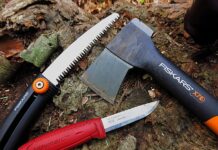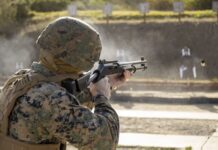So, how did all this get started? Why did I decide that my opinions mattered? Well, let’s start at the beginning:
There seems to be a bit of a void in the training community. There’s a ton of information out there for people who are at a “white belt” experience level. Likewise, there’s a lot of “brown belt” and ” black belt” level content available as well.
Why I Train: Filling the Gap
What I haven’t found much of is the middle ground, the “blue belts” documenting their progression and experiences. The regular guys who don’t carry guns or teach people to shoot as part of their job. The dudes who may know what the FAST test or Bill Drill are but may be hesitant to share their own performance because it’s not good enough for The ‘Gram.
The other glaringly absent element (for me, at least) is the reality of living with a firearm in professional business environments or other social circles where going armed isn’t the norm.
At best, this is enough of a shared experience that other folks can benefit from my trial & error. At worst, it’ll be a record of my training progress.
*yes, there will be a smattering of obscure pop culture references throughout my content.
In regards to training, everyone has different motivations as to why they do it. For some, it’s professional continuing education. For others, it’s what they do for fun. Certain people have had a life experience that has spotlighted the need to protect themselves.
Pondering My Motivation
I had the good fortune to spend some time chatting with Mickey Schuch of Carry Trainer at the 2019 Rangemaster Tactical Conference back in March. He asked me what my motivation was for continuing to train…and I didn’t have a good answer for him.
Driving to work the other day, I recalled a conversation I had with a good friend a few years back. During that chat, he asked, “If you were to hire someone to provide security for your family, would you pay someone with your current skill set and abilities?”
While I’m more comfortable with my present skill set than I would have been in the past, I certainly don’t feel that my abilities are at a level that would justify charging for services.
I may be the odd man out here. I’m not training to be the hero. I don’t have this scenario in my head about valiantly saving the day from a mass killer or a terrorist. I have no interest in Die Hard cosplay.
The reason that I train, and will spend my own time and money away from the family I’ve worked so hard to build, is because of exactly that—I have something to lose. My concern is that I’ll be confronted by somebody who is better than me and wants something that I’m unwilling to give.
So I work to ensure that pool of potential adversaries is as small as possible, to reduce the chances I’ll ever cross paths with one. Because “Live and let live” is a great philosophy for life, but it’s a poor defensive strategy.



